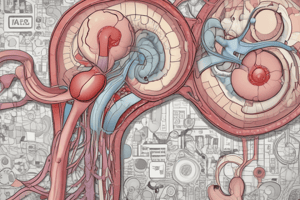Podcast
Questions and Answers
Which of the following statements about Chronic Kidney Disease (CKD) is NOT correct?
Which of the following statements about Chronic Kidney Disease (CKD) is NOT correct?
- CKD is a progressive condition characterized by a gradual decline in kidney function.
- CKD is primarily caused by genetic factors, with little influence from lifestyle. (correct)
- CKD can lead to end-stage renal disease (ESRD) if left untreated.
- The stages of CKD are categorized based on the glomerular filtration rate (GFR).
A patient with a GFR of 45 mL/min would be classified as having which stage of CKD?
A patient with a GFR of 45 mL/min would be classified as having which stage of CKD?
- Stage 4
- Stage 2
- Stage 3 (correct)
- Stage 1
Which of the following is NOT a potential symptom of CKD?
Which of the following is NOT a potential symptom of CKD?
- Increased energy levels and stamina (correct)
- Changes in urine output
- Nausea and vomiting
- Swelling in the legs and feet
A patient with CKD is advised to adopt a low-protein, low-phosphorus diet. What is the primary rationale for this dietary modification?
A patient with CKD is advised to adopt a low-protein, low-phosphorus diet. What is the primary rationale for this dietary modification?
Which of the following diagnostic tests is NOT typically used to evaluate CKD?
Which of the following diagnostic tests is NOT typically used to evaluate CKD?
Flashcards are hidden until you start studying
Study Notes
Chronic Kidney Disease (CKD)
Definition
- A progressive loss of kidney function over time, characterized by gradual damage to the kidneys
- Can lead to end-stage renal disease (ESRD) if left untreated
Stages of CKD
- Stage 1: Kidney damage with normal kidney function (GFR ≥ 90 mL/min)
- Stage 2: Kidney damage with mild decrease in kidney function (GFR 60-89 mL/min)
- Stage 3: Moderate decrease in kidney function (GFR 30-59 mL/min)
- Stage 4: Severe decrease in kidney function (GFR 15-29 mL/min)
- Stage 5: End-stage renal disease (ESRD) (GFR < 15 mL/min)
Causes and Risk Factors
- Diabetes: Leading cause of CKD, accounting for approximately 40% of cases
- Hypertension: Second leading cause of CKD, accounting for approximately 25% of cases
- Family history: Having a family member with CKD increases an individual's risk
- Age: CKD risk increases with age, especially after 65
- Obesity: Associated with an increased risk of CKD
- Smoking: Can damage kidney function and exacerbate CKD
Symptoms
- Often asymptomatic in early stages
- May experience:
- Fatigue
- Swelling in legs and feet
- Nausea and vomiting
- Changes in urine output
- Pain in the back or flank area
Diagnosis
- Urine tests: Check for proteinuria (excess protein in urine) and hematuria (blood in urine)
- Blood tests: Measure serum creatinine levels to estimate glomerular filtration rate (GFR)
- Imaging tests: Ultrasound, CT, or MRI scans to evaluate kidney structure and function
Treatment and Management
- Lifestyle modifications:
- Dietary changes (e.g., low-protein, low-phosphorus diet)
- Increased physical activity
- Weight management
- Smoking cessation
- Medications:
- ACE inhibitors or ARBs to slow disease progression
- Diuretics to manage fluid retention
- Phosphate binders to reduce phosphate levels
- Dialysis: May be necessary in advanced stages of CKD or ESRD
- Kidney transplantation: A potential treatment option for ESRD patients
Chronic Kidney Disease (CKD) Overview
- CKD is a progressive condition leading to a gradual reduction in kidney function.
- Untreated CKD can result in end-stage renal disease (ESRD).
Stages of CKD
- Stage 1: Kidney damage occurs with normal function (GFR ≥ 90 mL/min).
- Stage 2: Mild decrease in function (GFR 60-89 mL/min).
- Stage 3: Moderate decrease in function (GFR 30-59 mL/min).
- Stage 4: Severe decrease in function (GFR 15-29 mL/min).
- Stage 5: End-stage renal disease (ESRD) defined as GFR < 15 mL/min.
Causes and Risk Factors
- Diabetes: Major cause of CKD, responsible for ~40% of cases.
- Hypertension: Second most common cause, contributing to ~25% of cases.
- Family History: Increases risk if a family member has CKD.
- Age: CKD risk escalates with advancing age, particularly post-65.
- Obesity: Correlated with a higher likelihood of developing CKD.
- Smoking: Harms kidney function and can worsen CKD.
Symptoms
- Often asymptomatic during early stages, making early detection challenging.
- Possible symptoms include:
- Fatigue and low energy levels
- Edema, particularly in the legs and feet
- Nausea and vomiting sensations
- Variations in urine output
- Discomfort or pain in the back or flank areas
Diagnosis
- Urine Tests: Detect proteinuria (high protein levels) and hematuria (blood presence).
- Blood Tests: Measure serum creatinine to estimate glomerular filtration rate (GFR).
- Imaging Tests: Ultrasounds, CTs, or MRIs to examine kidney structure and functionality.
Treatment and Management
- Lifestyle Modifications:
- Dietary adjustments, focusing on low-protein and low-phosphorus options.
- Increasing physical activity and managing body weight.
- Quitting smoking to prevent further kidney damage.
- Medications:
- ACE inhibitors or ARBs help slow progression of the disease.
- Diuretics assist in managing fluid retention in patients.
- Phosphate binders reduce phosphate levels in the blood.
- Dialysis: Required for advanced CKD or at ESRD stage.
- Kidney Transplantation: A viable treatment option for patients with ESRD.
Studying That Suits You
Use AI to generate personalized quizzes and flashcards to suit your learning preferences.




